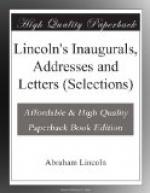This, plainly stated, is your language. Perhaps you will say the Supreme Court has decided the disputed Constitutional question in your favor. Not quite so. But waiving the lawyer’s distinction between dictum and decision, the court has decided the question for you in a sort of way. The court has substantially said, it is your constitutional right to take slaves into the Federal Territories, and to hold them there as property.
When I say the decision was made in a sort of way, I mean it was made in a divided court, by a bare majority of the judges, and they not quite agreeing with one another in the reasons for making it; that it is so made as that its avowed supporters disagree with one another about its meaning, and that it was mainly based upon a mistaken statement of fact—the statement in the opinion that “the right of property in a slave is distinctly and expressly affirmed in the Constitution.”
An inspection of the Constitution will show that the right of property in a slave is not “distinctly and expressly affirmed” in it. Bear in mind, the judges do not pledge their judicial opinion that such right is impliedly affirmed in the Constitution; but they pledge their veracity that it is “distinctly and expressly” affirmed there—“distinctly,” that is, not mingled with anything else—“expressly,” that is, in words meaning just that, without the aid of any inference, and susceptible of no other meaning.
If they had only pledged their judicial opinion that such right is affirmed in the instrument by implication, it would be open to others to show that neither the word “slave” nor “slavery” is to be found in the Constitution, nor the word “property” even, in any connection with language alluding to the things slave, or slavery; and that wherever in that instrument the slave is alluded to, he is called a “person;” and wherever his master’s legal right in relation to him is alluded to, it is spoken of as “service or labor which may be due”—as a debt payable in service or labor. Also it would be open to show, by contemporaneous history, that this mode of alluding to slaves and slavery, instead of speaking of them, was employed on purpose to exclude from the Constitution the idea that there could be property in man.
To show all this is easy and certain.
When this obvious mistake of the judges shall be brought to their notice, is it not reasonable to expect that they will withdraw the mistaken statement, and reconsider the conclusion based upon it?
And then it is to be remembered that “our fathers who framed the Government under which we live”—the men who made the Constitution—decided this same Constitutional question in our favor long ago: decided it without a division among themselves when making the decision; without division among themselves about the meaning of it after it was made, and so far as any evidence is left, without basing it upon any mistaken statement of facts.




